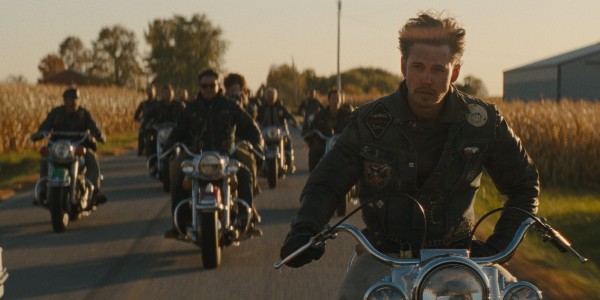THE BIKERIDERS: An Inspired, Understated Look at Early Bike Culture

David is a film aficionado from Colchester, Connecticut. He enjoys…
Jeff Nichols has long been one of my favorite modern filmmakers. His knack for capturing human fragility and emotion has always impacted me, whether it’s a sci-fi like Midnight Special or a more grounded biopic like Loving (both of which amazingly came out in the same year). Though it’s been a few years since we’ve been blessed with a Nichols picture, I’m glad that one has arrived. And though The Bikeriders may not quite reach the peak of his very best, it’s a worthy entry all the same.
Based on a True Story
The Bikeriders is about the Vandals Motorcycle Club (based on a real club called the Outlaws), which had its origin in the mid-1960s. The film depicts the lives of several members, namely Benny Cross (Austin Butler), Johnny Davis (Tom Hardy), Zipco (Michael Shannon), Cal (Boyd Holbrook), Bruce (Damon Herriman), and more. Over the course of several years, the gang forms, has conflicts with outside clubs, recruits members and chapters across the country, and more.

From the very first scene of The Bikeriders, this seems like a typical gangster film, styled similarly to Scorsese‘s Goodfellas, albeit focused on a motorcycle club. There is even a freeze-frame moment similar to that film, in which I almost expected to hear those famed introductory words from Ray Liotta‘s Henry Hill. Rather than hearing our protagonist’s voice, though (which would have been Benny), instead we hear from Kathy Cross (Jodie Comer, in a humorously perfect Chicago accent), who is telling her retrospective story to journalist Danny Lyon (Mike Faist).
By telling the story through the perspective of an outsider to the club, who falls in with them after becoming romantically connected with Benny, the film diverts from the path of testosterone-fueled machismo that is at the center of many gangster films, and instead shines a lot on the identity of the motorcyclists themselves and of the culture surrounding them. This is a devoted and loyal motorcycle club, but it’s not as hard-edged as you might expect.
Motorcyclists and Motorcycle Culture
Benny (the suave Butler in perhaps his finest role since Elvis) is a bit of a loose cannon, often starting fights with rival motorcycle gangs, but he has a big heart as well. Johnny (Hardy in a distractingly odd high-pitched voice) gives the impression of being a ruthless leader, yet he’s surprisingly compassionate. Zipco, Cal, and Brucie are more seasoned members of the club, yet they’re terrified of getting into a fight. For every stereotypical member or gangster trope, Nichols changes it up, with some unexpected results.
The Bikeriders takes place at a time before motorcycle culture led to full-on gang violence. Perhaps most indicative of this is a moment when Johnny and another club leader confront each other at a rally. Misreading the situation, Benny comes in swinging, and soon a fistfight ensues between the rival gangs. After a few minutes of this, though, the two gangs just seem to shrug it off, and then spend the rest of the evening drinking together and trading stories around a fire. Later on, Funny Sonny (Norman Reedus, notable motorcycle enthusiast) comes to join them, and though he was hired to fight one of the Vandals members, instead he decides to join them as if they’re all old time buddies.

As Kathy explains to Danny, it’s only later on that motorcycle clubs like the Vandals started to get into more ruthless behavior, such as violence, trafficking drugs, and even murder. The Bikeriders is therefore much tamer of a film than you would expect; rather than lean into the violence, instead it pulls away from it. It’s a subversively understated approach, something which I admire about Nichols‘ direction, yet at the same time one can’t help but feel that The Bikeriders loses some of its potential impact as a result. But perhaps what Nichols is really saying here is that he’s nostalgic for these days of old. Just look at our current socio-political division – can you even imagine people on opposite sides of the aisle having beers together around a fire?
The 1960s
Where Nichols often outshines his contemporaries is with his attention to detail. The 1960s here are precisely recreated, from the lavish leather outfits, over-gelled hair, old-timey cars, and wallpaper-splayed brightly colored houses. Even moreso than the production design are the precise details that Nichols conveys, such as the perfectly-timed needle drops throughout, featuring artists like Muddy Waters, Bo Diddley, and The Shangri-Las. Think Easy Rider, but with less obvious choices. Every decision that Nichols makes throughout lends itself to the atmosphere of the film, and it is often an alluring one.
Conclusion
To conclude, The Bikeriders is a memorable addition to Jeff Nichols’ ouvre. Shining a light on motorcycle culture in the 1960s, it also boasts some fine performances, especially from Austin Butler and Jodie Comer. Jeff Nichols pulls us into this time and era, when people were willing to look around their differences and be friendly with one another. It’s a journey worth taking.
The Bikeriders opened in theaters on June 21st, 2024.
Does content like this matter to you?
Become a Member and support film journalism. Unlock access to all of Film Inquiry`s great articles. Join a community of like-minded readers who are passionate about cinema - get access to our private members Network, give back to independent filmmakers, and more.
David is a film aficionado from Colchester, Connecticut. He enjoys writing, reading, analyzing, and of course, watching movies. His favorite genres are westerns, crime dramas, horror, and sci-fis. He also enjoys binge-watching TV shows on Netflix.













